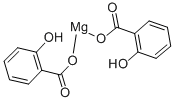| Identification | More | [Name]
Magnesium salicylate | [CAS]
18917-89-0 | [Synonyms]
MAGNESIUM SALICYLATE
Magnesium, bis(2-hydroxybenzoato-O1,O2)-, (T-4)-
Disalicylic acid magnesium salt
Magan
Mobidin | [EINECS(EC#)]
242-669-3 | [Molecular Formula]
C14H10MgO6 | [MDL Number]
MFCD00045815 | [Molecular Weight]
298.53 | [MOL File]
18917-89-0.mol |
| Questions And Answer | Back Directory | [Description]
Magnesium Salicylate is a common analgesic and non-steroidal anti-inflammatory drug (NSAID) used to treat mild to moderate muscular pain. It is also used to treat headaches, general back pain, and certain joint pains like arthritis. It is found in a variety of over-the-counter (OTC) medications as an anti-inflammatory, primarily for back-pain relief. Magnesium Salicylate can be an effective OTC alternative to prescription NSAIDs, with both anti-inflammatory and pain-relieving effects.

| [Trade name]
Generic and brand names: magnesium salicylate, oral; Backache Maximum Strength Relief; DeWitt’s Backache; Doan’s Extra Strength; Percogesic Maximum Strength Backache Relief (There may be other brand names for this medicine.)
| [Uses]
Magnesium salicylate is used to relieve pain from various conditions. It also reduces pain, swelling, and joint stiffness from arthritis. This medication is known as a nonsteroidal anti-inflammatory drug (NSAID). It is used to treat mild to moderate pain. It is also used to treat the pain and swelling of arthritis. | [Mechanism of action]
Most NSAIDs act as nonselective inhibitors of the enzyme cyclooxygenase (COX), inhibiting both the cyclooxygenase-1 (COX-1) and cyclooxygenase-2 (COX-2) isoenzymes. COX catalyzes the formation of prostaglandins and thromboxane from arachidonic acid (itself derived from the cellular phospholipid bilayer by phospholipase A2). Prostaglandins act (among other things) as messenger molecules in the process of inflammation.
| [Clinical use]
rheumatoid arthritis
joint damage causing pain and loss of function
inflammation of the lining of a joint
inflammation of the sac surrounding the joint - bursitis
fever
pain
rheumatic fever
joint inflammatory disease in children and young adults
inflammation of a tendon
inflammation of the covering of a tendon
| [Side effects]
Side effects that you should report to your doctor or health care professional as soon as possible:
allergic reactions like skin rash, itching or hives, swelling of the face, lips, or tongue
black, tarry stools
bloody, coffee ground-like vomit
breathing problems
changes in hearing or ringing in the ears
confusion
pain on swallowing
trouble passing urine or change in the amount of urine
unusual bleeding or bruising
unusually weak or tired
Side effects that usually do not require medical attention (report to your doctor or health care professional if they continue or are bothersome):
diarrhea or constipation
nausea, vomiting
stomach gas or heartburn
This list may not describe all possible side effects.
| [Drug Interactions]
Ask a doctor or pharmacist if it is safe for you to use magnesium salicylate if you are also using:
insulin or oral diabetes medicine;
gout medicine;
a steroid medicine;
NSAIDs (nonsteroidal anti-inflammatory drugs)--aspirin, ibuprofen (Advil, Motrin), naproxen (Aleve), celecoxib, diclofenac, indomethacin, meloxicam, and others; or
a blood thinner--warfarin, Coumadin, Jantoven, and others.
This list is not complete. Other drugs may interact with magnesium salicylate, including prescription and over-the-counter medicines, vitamins, and herbal products. Not all possible interactions are listed in this medication guide.
|
|
|






